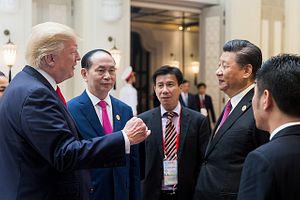Tensions over Taiwan are mounting between the U.S. and China. On July 7, 2018, two U.S. Navy destroyers passed through the Taiwan Strait, provoking fierce protests from the Chinese. However, neither U.S. President Donald J. Trump nor Chinese President Xi Jinping are looking to start a war.
Trump’s attention is limited to U.S. national interests. He avoids involvement in overseas events that do not affect the U.S., instead preferring to direct his strength to shoring up and expanding the nation’s economic interests. And Trump sees China as the single biggest factor standing in the way of U.S. prosperity.
China, meanwhile, is looking out for its own economic interests. The Central Committee of the Communist Party of China needs to deliver economic development to prevent discontent from building up in Chinese society, and to this end is intent on designing international rules on its own terms. Those intentions have been on full display with China acting as if it were the standard-bearer for free trade at events such as the Belt and Road Initiative summit in May 2017. Xi’s Made in China 2025 concept has also ramped up the sense of impending danger for U.S. firms. This is because the ten key areas China has identified, among which are next-generation information technologies, are the same areas American companies must target to expand their businesses and generate profits in the future.
China is also engaged in a military buildup it sees as necessary to protect its external economic activities, adding further fuel to tensions. Under this climate, the 2019 National Defense Authorization Act that was signed into law on August 13 increased defense spending to $717 billion in an effort to rebuild the U.S. military, laying bare the sense of threat that China poses.
In addition to economic pressure, Trump is placing military pressure on China in connection with North Korea, the South China Sea and Taiwan. China recognizes that both economically and militarily, it is still not the equal of the United States, and while it appears to be trying to flex its muscles, there are many aspects it must concede to the U.S. There is, however, an issue on which China cannot compromise, and that is Taiwan. Unification with Taiwan is an issue that goes to the heart of the legitimacy of the Chinese Communist Party’s rule. If Taiwan were to declare independence, China would likely employ military force against Taiwan even with the knowledge that it could not prevail against U.S. forces.
Since the spokesman for the Taiwan Affairs Office of the State Council declared the cessation of dialogue with Taiwan in June 2016, China has stepped up its military pressure on Taiwan. In December 2016, six Chinese aircraft including two Su-30 fighters, two H-6 long-range bombers and two surveillance planes flew over the western Pacific, during which the bombers and surveillance planes returned to China via the Bashi Channel.
This was followed by a fleet led by the training aircraft carrier Liaoning departing from Qingdao and then tracking south through waters to the east of Taiwan before passing through the Bashi Channel on the way to Hainan. Later in January 2017, the fleet travelled north through the Taiwan Strait on its return to Qingdao. While denied by China’s Ministry of National Defense, some have described this as a warning directed at Taiwanese president Tsai Ing-wen, who supports Taiwanese independence, that China will hold fast to its “One China” policy. In August 2017, Chinese military aircraft made repeated flights around Taiwan.
China’s position on Taiwan has been even tougher in 2018. In April, China conducted military exercises in the vicinity of Taiwan and made a series of related announcements. Of particular interest were comments by the spokesman for China’s Taiwan Affairs Office, who said the message China was sending was “extremely clear,” with the added warning that “if Taiwan independence forces continue to do as they please, we will take further steps.” This represented an official effort to intimidate Taiwan.
One of the factors behind China’s hardline stance is the Taiwan Travel Act, a U.S. law enacted to revitalize reciprocal visits between the United States and Taiwan by cabinet members and high-level government officials. The bill, which was submitted to the U.S. House and Senate in 2017, made congressional passage in February 2018 and was signed into law by Trump in March.
This can be seen as demonstrating the effects of Trump’s economic and military pressure on China. One of the factors giving teeth to the U.S. pressure is the unstable internal political climate in China. After declaring a campaign against corruption, Xi’s moves to concentrate his own power have led to instability.
While the Chinese People’s Liberation Army (PLA) has borne the brunt of this anti-corruption campaign, the PLA is one of the actors motivated to escalate the Taiwan issue inside China. Inside the Chinese military, some believe that if military tensions with Taiwan were to intensify, the Chinese government would be too preoccupied to pursue its anti-corruption agenda against the PLA. If military pressure on Taiwan is used as a means of ratcheting up military tensions while avoiding a direct clash with the United States, the internal political situation in China will become increasingly unstable and tensions between China and Taiwan will continue to intensify.
Trump’s policy of pressuring China on U.S. economic interests and China’s domestic political climate represent a complex set of interactions that only further complicate the issue of Taiwan.
Bonji Ohara is a senior fellow at The Sasakawa Peace Foundation.

































